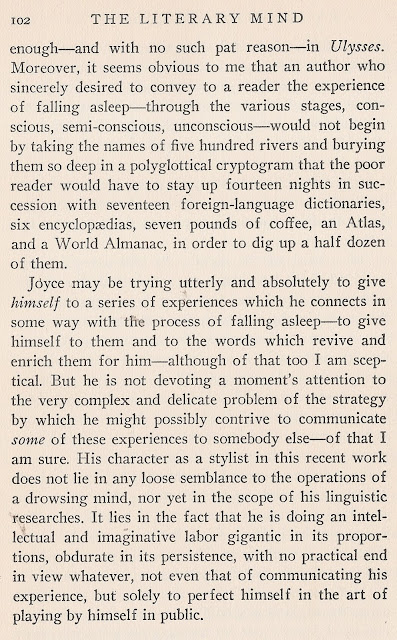Joyce's greatest champion while writing Finnegans Wake was Eugene Jolas, who published thirteen extracts from 'Work in Progress' in his avant-garde journal, transition.
In 1932, for an edition of transition marking Joyce's 50th birthday, Jolas got the Spanish artist, César Abin, to do this caricature of him. The comic details were all suggested by Joyce himself.
While many of Joyce's critics rejected 'Work in Progress' as unintelligible, Jolas loved it for that very reason. In 1929, he published a manifesto, The Revolution of the Word, in which he wrote:
THE WRITER EXPRESSES. HE DOES NOT COMMUNICATE.
THE PLAIN READER BE DAMNED.
This was signed by sixteen writers, but not by Joyce. He refused not only because he did not sign manifestos, but also because he believed that he was writing for the plain reader!
 |
| Jolas helps Joyce correct Wake proofs in 1938 |
Eastman accused Joyce of inventing a private language:
 |
| Max Eastman (1883-1969) |
Not long after this article was published, Eastman was in Paris where he visited the Shakespeare & Co bookshop and met Sylvia Beach (publisher of Ulysses). Eastman expected hostility from Beach, but she surprised him by saying, 'Joyce likes your essay in Harper's so much - I wonder if you would have time to take tea with him while you are in Paris.'
Eastman described his subsequent meeting with Joyce in his 1931 book The Literary Mind: Its Place in An Age of Science, which the postman delivered to me this very morning. It's the source of some famous quotations from Joyce, such as 'The demand I make of my reader is that he should devote his whole life to reading my works.' But because the book is hard to find, and it's so fascinating, I've scanned the whole Joyce section. The chapter's title is 'Poets Talking to Themselves'.
1 There is now 'an international bureau for the decoding' of Finnegans Wake - it started in 1962 with Clive Hart and Fritz Senn's Wake Newslitter. The findings were put together in book form by Roland McHugh in three editions of Annotations to Finnegans Wake. Now it's all online in Raphael Slepon's wonderful fweet website.






No comments:
Post a Comment